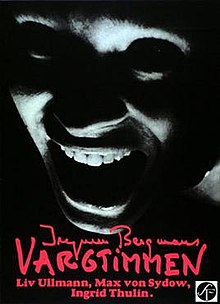Hour of the Wolf
| Hour of the Wolf | |
|---|---|

Original Swedish theatrical poster
|
|
| Directed by | Ingmar Bergman |
| Produced by | Lars-Owe Carlberg |
| Written by | Ingmar Bergman |
| Starring |
Max von Sydow Liv Ullmann Gertrud Fridh Georg Rydeberg Erland Josephson Ingrid Thulin |
| Music by | Lars Johan Werle |
| Cinematography | Sven Nykvist |
| Edited by | Ulla Ryghe |
|
Production
company |
|
| Distributed by | Lopert Pictures Corporation |
|
Release date
|
19 February 1968 (Sweden) |
|
Running time
|
87 min. |
| Country | Sweden |
| Language | Swedish |
| Box office | $250,000 (US) |
Hour of the Wolf (Swedish: Vargtimmen) is a 1968 Swedish surrealist–psychological horror–drama film, directed by Ingmar Bergman and starring Max von Sydow and Liv Ullmann.
Although Hour of the Wolf is seldom listed among Bergman's major works by critics, it was ranked one of the 50 greatest films ever made in a 2012 directors' poll by the British Film Institute. The film is followed by Bergman's thematically-related films Shame (1968) and The Passion of Anna (1969).
During the opening credits, Bergman can be overheard giving instructions to and discussing with his staff while preparing a shot.
The film is framed through the account of Alma (Ullmann), who addresses the audience directly. She tells of her husband's disappearance, which is explored in a flashback constructed of his diaries and her words.
Painter Johan Borg (von Sydow) and his young wife Alma live on the small island of Baltrum, where he seeks rest after a crisis which is not detailed. He is regularly approached by odd and suspicious people. He confides to Alma that he believes them to be demons, and begins to give names to them, including the Bird-Man, the Insects, the Meat-Eaters, the Schoolmaster (with pointers in his trousers) and The Lady With a Hat. Also, his insomnia grows worse. On the nights when Johan cannot sleep, Alma stays awake by his side.
One day, an old lady stops by the house and tells Alma to read Johan's diary, which he hides under his bed. Alma discovers that Johan is not only haunted by the real or imaginary strangers, but also by images of his former lover, Veronica Vogler (Ingrid Thulin).
The couple are approached by a Baron von Merkens (Erland Josephson), who lives in a nearby castle. The painter and his wife visit them and their surreal household. After dinner, the baron's wife (Gertrud Fridh) shows the couple into her bedroom, where on display is a portrait of Veronica by Borg. The painting appears to be so beautiful, the baron's wife proclaims, "It has become like a part of my solitary life. I love her." After Johan and Alma leave the castle, she confesses to him her fear of losing him to the demons, but also her will not to give up easily.
...
Wikipedia
